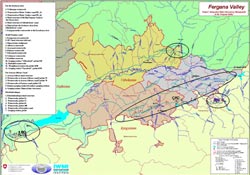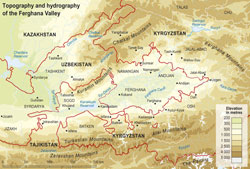
 |
 |
 |
 |
 |
 |
 |
 |
 |
 |
 |
 |
Ferghana Valley Canal Automation Project
Background
In many places in the Ferghana Valley, the irrigation infrastructure is in dire need of repair. There are also problems with water measurement, control and accounting. A repaired infrastructure should enable users to conserve more water. The irrigation system in the Ferghana Valley (and beyond) is characterized by considerable seasonal variation of water availability, insufficient funding of water management organizations, inadequate system maintenance, poor irrigation practices and unreliable water supply. These conditions lead to inequitable water distribution, which exacerbates the potential for conflict, as well as excessive water use, significant water losses and consequently high drainage volumes.
The countries sharing the Ferghana Valley support the ongoing process of rural restructuring and making arrangements towards compatible water sector institutions and organizations. The irrigation systems can be improved by using computerized automatic control of canal gates and the related data acquisition and communication.
Project description
The project is being implemented in the Ferghana Valley and consists of a two-step approach – automation of the main hydro unit structure located in the area of Uch-Kurgan and of the hydro units along the three pilot canals (the South Ferghana Canal in Uzbekistan, Aravan-Akburra Canal in Kyrgyzstan and Khoji Bakirgan Canal in Tajikistan) selected within the framework of the Integrated Water Resource Management Project (IWRM).
The project is designed to improve the technical management of the canals through remote water regulation and control. It is investigating possibilities for water saving and economic efficiency.
The project aims to improve the operation of the irrigation system and ensure efficient water allocation. It also aims at finding a balance and smoothening out the water flow fluctuations originated by the operation of the upstream Toktogul Power Cascade and Uch-Kurgan main waterworks.
The implementing agency for the project is the Interstate Commission for Water Co-ordination (ICWC) of Central Asia. Execution of the project has been mandated to SIGMA under the supervision of the Syr Darya Basin Water Organization (BWO) and external technical supervision from the Scientific Information Centre (SIC) of the ICWC.
The project is installing automated equipment to allow the optimum allocation of water that will lead to better decision making and enhanced water management, an interlinked complex irrigation system and improved economic efficiency of the system. The automation of the pilot canals, including the installation of measuring and data transmission equipment, is the technical backbone which will help reorganize irrigation management both at canal and basin levels.
The project has already installed automated sluice gates, flow measurement and data transmission equipment at the BWO Syr Darya hydro structures and along the Aravan-Akburra canal. This will create grounds for successful Integrated Water Resource Management within the respective command areas. Aravan-Akburra is the first pilot canal that has begun trial operations. It is expected that all technical works along the other two participating canals – South Ferghana and Khoji Bakirgan – will be completed by the end of 2008.
Approach
For maximum effectiveness, reforms in the irrigation sector are implemented through a participatory approach. Users and suppliers of water, as well as political bodies, are involved in the structural reform process.
Outlook
Successful implementation of the project will lead to the improvement of crop yields (mainly cotton, wheat, and vegetables) by adapting irrigation management needs to modern technologies, i.e. drainage systems in order to maintain soil fertility, efficient water use, equitable water allocation etc.
New automated systems will allow water to be used efficiently and will provide the technical basis for the increased effectiveness of water management. Charges for water use will be introduced based on the experience of the IWRM project. Automation of the mentioned canals will further promote IWRM principles in the Ferghana Valley, thus contributing to more secure livelihoods, increased environmental stability, reduced water-related conflicts and greater social harmony in Central Asia.





